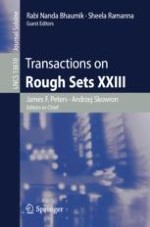2022 | OriginalPaper | Buchkapitel
Named Entity Recognition on CORD-19 Bio-Medical Dataset with Tolerance Rough Sets
verfasst von : Seeratpal Jaura, Sheela Ramanna
Erschienen in: Transactions on Rough Sets XXIII
Verlag: Springer Berlin Heidelberg
Aktivieren Sie unsere intelligente Suche, um passende Fachinhalte oder Patente zu finden.
Wählen Sie Textabschnitte aus um mit Künstlicher Intelligenz passenden Patente zu finden. powered by
Markieren Sie Textabschnitte, um KI-gestützt weitere passende Inhalte zu finden. powered by
